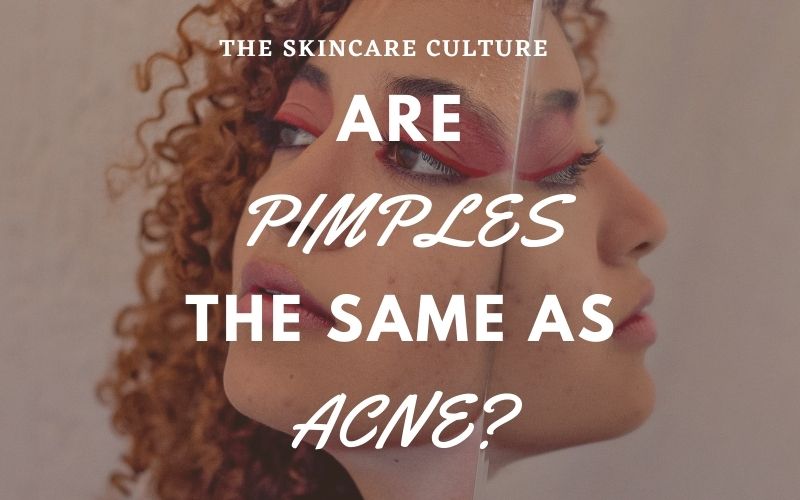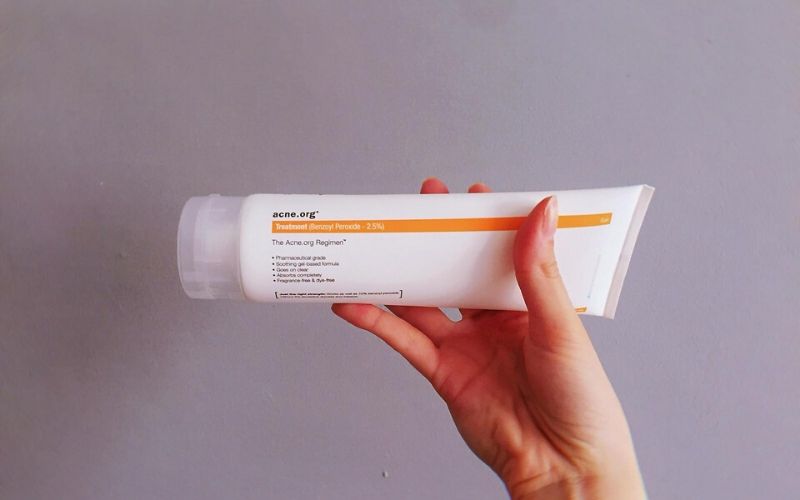Are pimples and acne the same thing?
The difference between pimples and acne is that acne vulgaris is a skin condition and pimples are one of its symptoms.
This condition is incredibly common and it affects the skin’s hair follicles (pores) and oil-producing glands.

What Causes Acne?
The only thing that causes acne is a clogged pore.
Under your skin, your pores are connected to the sebaceous glands that make an oily substance known as sebum. The glands and pores are connected by a canal known as a follicle that has thin hair that grows out to the skin’s surface.
When sebum and dead skin cells clump together, they form a plug in the follicle. Bacteria in the plug causes inflammation, leading to red pimples and eventually acne.
However, there are several other things that can stimulate the sebaceous glands into overproducing sebum and clogging the pores. Here are some of them:
- hormonal changes, such as puberty, pregnancy, and the menstrual cycle can cause hormonal acne
- pressure such as from collars, hats, helmets, and face masks can cause acne mechanica
- high humidity makes the skin oilier than dry places
- medications such as corticosteroids and anabolic steroid can intervene with hormones and cause acne
- using harsh cleansers that strip your skin off its natural oil and force the sebaceous glands to produce more and more sebum
- using exfoliating scrubs on active acne as this can rupture the skin and cause the bacteria to spread on other areas
- excessively oily skincare and makeup products, sunscreens, and hair products that stay on your pillow and get attached to your skin
- eating sugary and high glycemic foods
- having a diet that consists of excessively junk food and not enough healthy options to balance it out
These are just some of the factors that can contribute to pimple-formation. You need to pay attention to your individual skincare, lifestyle, and hygiene habits as this can help you determine your triggers.
READ: How I Healed My Cystic Acne In 5 Days
Acne Symptoms
There are acne symptoms that range from mildest to most severe. Here are some of them:
- blackheads – clogged pores on the skin’s surface that have an open end and the tip of the solidified sebum inside the pore has become black due to oxidation
- whiteheads – clogged pores that are under the skin’s surface but are still visible and can’t be popped. Also known as millia
- papules – tender, red, pink, or purple-ish bumps that are uncomfortable to the touch. Squeezing them can be very painful and nothing comes out, usually
- pustules – papules with pus on top. They can be squeezed but it’s not recommended as you can cause the bacteria to seep into the pores and cause infection in the surrounding areas
- nodules – large, painful lumps deep under the skin’s surface caused by severe infection and bacteria overgrowth
- cysts – painful, often pus-filled lumps under the skin’s surface that are usually purple or darker in color
Acne symptoms can be mild or severe, therefore, don’t panic if you get some of these occasionally, but take it as a sign to be more cautious of what you are using on your skin or if there are some underlying issues such as hormonal imbalance.
What Can You Use For Acne and Pimples?

Depending on the severity of your individual concern, you can use over-the-counter or prescription products and antibiotics for acne and pimples.
Over-the-counter treatments are the easiest ones available and can usually take care of mild to moderate acne and pimples.
Here are some of them:
- Salicylic acid – sits at the heart of the solution against the acne battle. Besides being gentle on your skin, it is an excellent chemical exfoliant which can penetrate deep into the pores and clear them out of excess acne-causing stuff like excess oil and dead skin cells.
- Benzoyl peroxide – if your acne is leaning towards moderate to severe, this treatment can help reduce and eliminate the overgrowth of acne-causing bacteria in your pores by infusing them with oxygen. It is the best over-the-counter treatment for more severe acne.
- Adapalene – an OTC topical acne treatment that belongs to the family of retinoids. Retinoids are most popular for their anti-aging benefits but are also prescribed by dermatologists for severe acne issues, too. Adapalene is the only over-the-counter retinoid that’s shown to be incredibly effective for treating moderate and even severe acne.
In addition to topical OTC acne treatments, you also have prescription options, which are much stronger.
Here are some of them:
- antibiotics, such as topically applied clindamycin
- tretinoin (Retin-A) – a prescription-strength retinoid
- azelaic acid – an ingredient that helps both acne and red or dark scars left after its healed
Furthermore, your dermatologist might advise you to take oral medications if your concern is severe and stubborn.
Some oral medications commonly prescribed to acne patients are:
- isotretinoin (Accutane or Roaccutane)
- combined antibiotics such as spironolactone or doxycycline
- combined oral contraceptives
How to Avoid or Prevent Acne and Pimples?
Here are three easy things that you can start doing today to avoid acne and pimples and prevent an onset of future outbreaks:
Take good care of your skin
The skin is a protective organ and while it is pretty resilient on its own, it still benefits from a good skincare routine.
Therefore, try to be gentle to your skin and try to have at least a mild cleanser and a moisturizer into your routine to keep it clean and lubricated.
When your skin is clean, there is nothing that can potentially clog the pores and when it is sufficiently moisturized, it doesn’t feel the need to produce more oil to keep itself lubricated but also clog the pores and cause acne.
Regular exfoliation prevents future breakouts
By regularly exfoliating your skin with gentle acids, you are helping it increase cellular turnover so that there aren’t dead skin cells stuck into your pores to cause clogging.
Regular exfoliation is a part of a good skincare routine and it helps keep the pores clear from oils, cells, and bacteria overgrowth.
That said, exfoliation is also a step that should be reserved for no more than 2-3 times a week.
Protect your skin from the sun
Wearing sunscreen regularly isn’t going to do much in terms of preventing future acne, however, it will help lessen the damage that is usually associated with acne.
This means that if you already have acne, acne scars like hyperpigmentation and post-inflammatory redness are going to heal significantly faster when you protect your skin from the harmful UV rays.

My name is Simone and I am a certified skin specialist. I created this website to teach my readers how to take great care of their skin and I also like to occasionally share my honest opinions on skincare products I’ve tried. You can learn more about me here.
